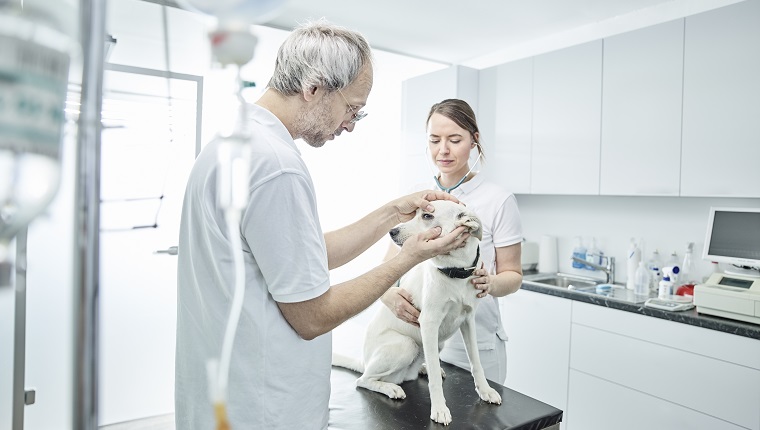- August 18, 2022
- No Comment
- 4 minutes read
Horner’s Syndrome In Dogs: Symptoms, Causes, & Treatments – DogTime

(Picture Credit: Westend61/Getty Images)
Horner’s syndrome in dogs, also sometimes referred to as droopy eye, is the name given to a neurological disorder that usually affects a canine’s eyes and face muscles. It can produce a variety of symptoms that include drooping eyes and eyes that look like they have shrunk in size.
The condition can often result from brain or spinal injuries. However, in a lot of cases, the precise cause remains unknown; although it does seem to affect male Golden Retrievers and Collies much more than other breeds.
Advertisement
If you see the signs of a neurological disorder in your dog, then you must get to a veterinarian for a proper diagnosis and advice. Here’s what you should know about the symptoms, causes, and treatments for Horner’s syndrome in dogs.
Symptoms of Horner’s syndrome in dogs can usually be noticed by looking at a dog’s eyes and facial muscles.
Some of the most frequent symptoms include:
(Picture Credit: Thirawatana Phaisalratana/Getty Images)
The cause of Horner’s syndrome in dogs sometimes relates to a recent brain or spinal injury. Infections can also cause this syndrome. But many cases are considered to be idiopathic, which means the precise cause remains unknown.
While all dog breeds can develop the condition, male Golden Retrievers and Collies seem to have the highest risk of suffering fromit.
If you worry that your dog is developing Horner’s syndrome, then your veterinarian will want to carry out a physical examination of your dog along with taking blood and urine samples.
Your vet will ask detailed questions about your canine’s recent history to try and figure out if they have suffered any trauma or injuries that could have potentially caused the condition.
In most cases, vets will use radiographic techniques like MRIs and X-rays to form a diagnosis.
Treatment generally focuses on targeting the underlying cause of the condition. If there is an infection, then a vet will prescribe a course of medication or antibiotics.
As ever, if your vet prescribes your dog any medication, then it is vital that you stick to the precise dosage and administration instructions and complete the entire course of medicine.
In a lot of cases, vets will recommend eye medication and lubricants as a way to help alleviate any immediate eye pain or issues that your dog is experiencing.
Has your dog developed Horner’s syndrome? What treatment did your vet recommend? Let us know in the comments section below.

